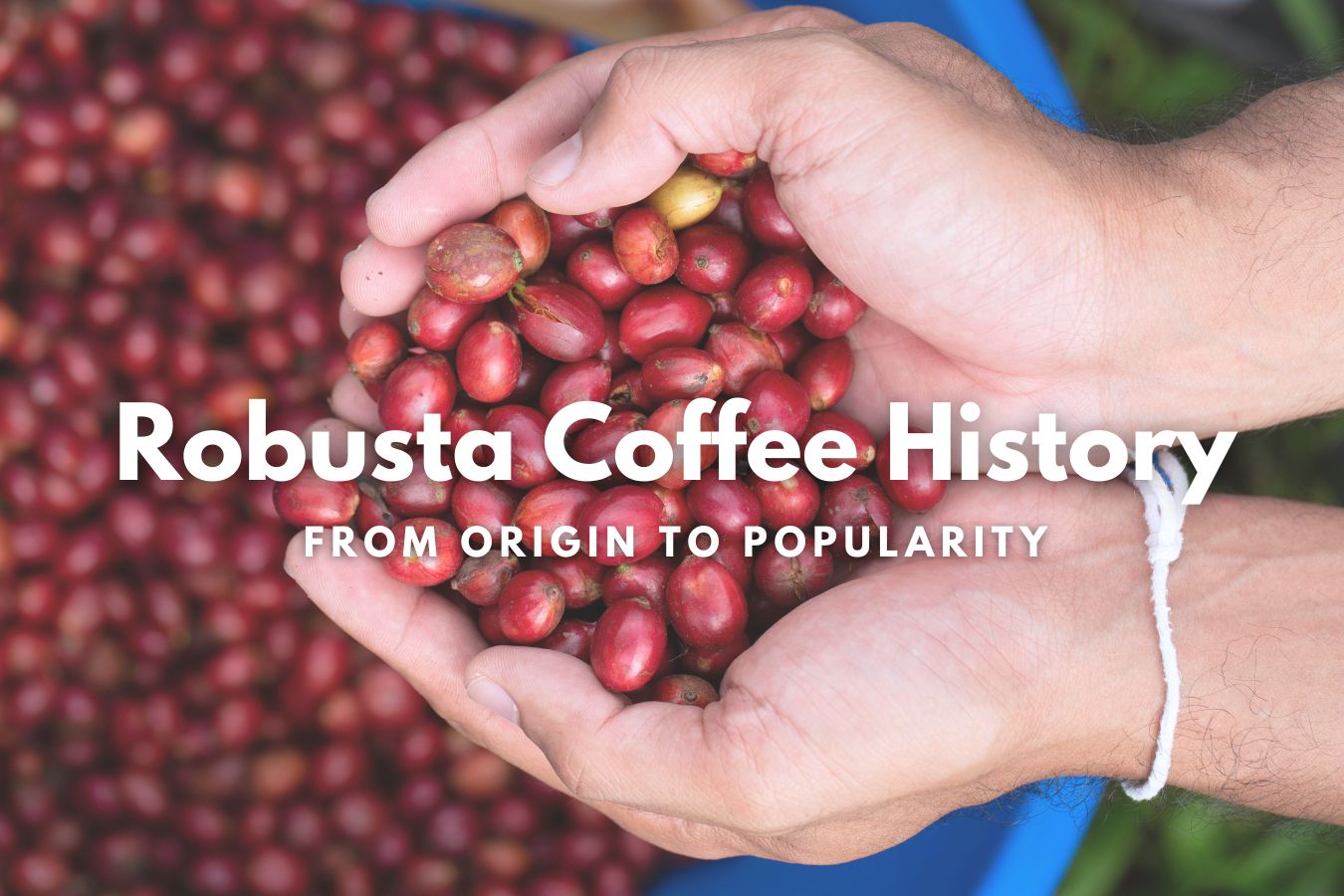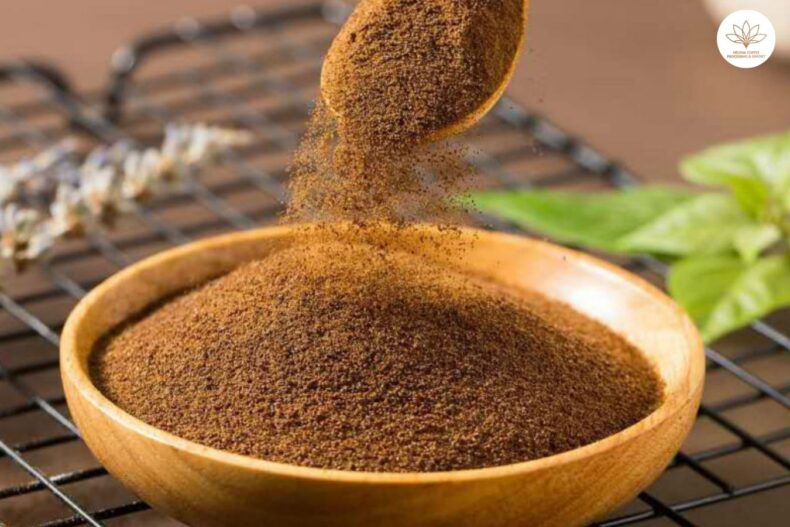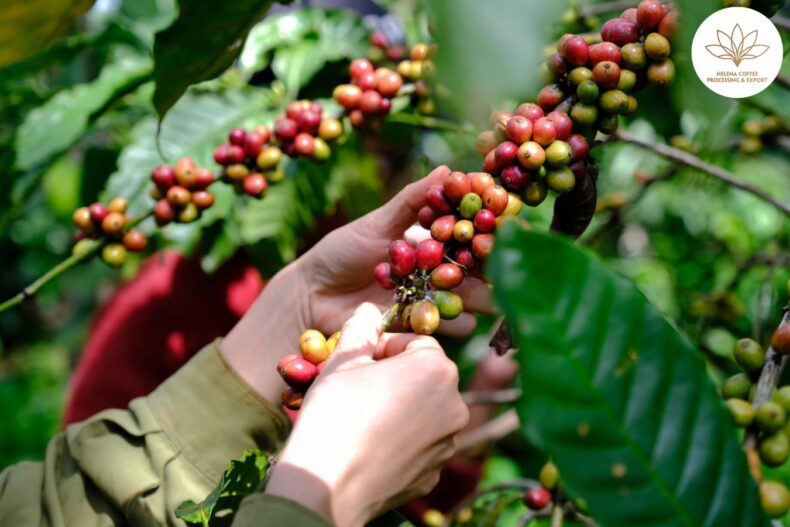
Coffee has a long and storied history, dating back hundreds of years. Today, there are several different types of coffee, each with its unique flavor and aroma. Robusta is one of the most popular coffee types, known for its bold flavor and high caffeine content. In this article, we will explore the Robusta coffee history, from its origin to its popularity in the modern-day.
Robusta Coffee History: Origin of Robusta Coffee
Robusta Coffee History: Tracing the Origins and Global Spread of Robusta Coffee
Robusta coffee, scientifically known as Coffea canephora, traces its roots back to Africa’s lush and diverse Congo Basin. First discovered by European explorers in the late 1800s, this robust and hardy coffee species quickly gained attention for its ability to thrive in challenging conditions.
The early 20th century saw the introduction of Robusta coffee to Southeast Asia, with Indonesia being one of the first countries to cultivate the plant. However, the focus in Indonesia gradually shifted towards the more sophisticated flavor profiles of Arabica coffee, leaving Robusta to find a new home for mass production.
By the 1990s, Vietnam had become a significant player in the global coffee industry, with Robusta coffee becoming the country’s primary cash crop. As a result of widespread cultivation and strategic investment, Vietnam eventually secured its position as the world’s largest producer of Robusta coffee.
The name “Robusta” aptly captures the essence of this coffee species, known for its resilience and adaptability. With an innate resistance to diseases and pests, Robusta coffee plants can prosper in a broader range of growing conditions than their delicate Arabica counterparts. These plants can thrive at lower altitudes and tolerate hotter temperatures, making them a more cost-effective and accessible option for coffee growers.
Throughout its history, Robusta coffee has garnered appreciation for its bold flavor and high caffeine content. While Arabica coffee may enjoy more incredible popularity among coffee connoisseurs, the unique characteristics and storied past of Robusta coffee continue to hold a special place in the hearts of many coffee enthusiasts worldwide.
Distinctive Traits of Robusta Coffee: Flavor, Size, and Resilience
With its unique flavor and physical attributes, Robusta coffee stands apart from other coffee varieties, such as Arabica. Known for its strong, earthy taste, Robusta coffee offers a bold and robust drinking experience, often marked by a pronounced bitterness. In contrast to Arabica’s more delicate and nuanced flavor profiles, Robusta coffee has a lower acidity, contributing to its distinctive taste.
When examining the beans themselves, several key differences become apparent. Robusta coffee beans are more petite than Arabica beans, featuring a rounder and more compact shape. These beans are encased in a thicker, more rigid shell, a natural protective barrier against pests and diseases. This hardiness is one of the primary reasons why Robusta coffee is more accessible and economical to cultivate than its Arabica counterpart.
Another distinguishing characteristic of Robusta coffee is its high caffeine content, nearly double that of Arabica coffee. This elevated caffeine level provides a refreshing boost for coffee drinkers and serves as a natural deterrent to insects and pests, further contributing to the plant’s resilience.
In summary, Robusta coffee’s distinct flavor, size, and hardiness set it apart from other coffee varieties, making it a popular choice for those seeking a bold and unique coffee experience. Its natural resistance to pests and disease and its high caffeine content contribute to its accessibility and appeal to coffee growers worldwide.
Robusta vs. Arabica Coffee
Arabica and Robusta are the two most commonly grown types of coffee in the world. Arabica coffee is grown at higher elevations and is known for its complex flavors and aromas. It is also more expensive than Robusta. Robusta, on the other hand, is grown at lower elevations and is less costly. It is also less flavorful than Arabica but has a stronger, more robust flavor.
Comparison of Robusta and Arabica Coffee
| Attribute | Robusta Coffee | Arabica Coffee |
|---|---|---|
| Flavor | Bold, earthy, bitter | Delicate, nuanced, fruity |
| Acidity | Lower acidity | Higher acidity |
| Caffeine Content | Higher (1.7-2.7% by weight) | Lower (0.8-1.4% by weight) |
| Bean Shape | Smaller, rounder | Larger, elongated |
| Bean Shell | Thicker, more rigid | Thinner, more fragile |
| Disease & Pest Resistance | Greater resistance | Less resistance |
| Growing Altitude | 0-800 meters (0-2,625 feet) | 800-2,200 meters (2,625-7,218 feet) |
| Production Cost | Lower, more economical | Higher, more expensive |
| Global Production Share | Approximately 30-40% | Approximately 60-70% |
This table compares the key differences between Robusta and Arabica coffee, including aspects related to flavor, physical attributes, growing conditions, and production. By understanding these distinctions, coffee enthusiasts can better appreciate the unique characteristics each variety brings to the coffee experience.
The Rising Popularity of Robusta Coffee: Flavor, Caffeine, and Affordability
In recent years, Robusta coffee has experienced a surge in popularity, driven by several key factors that set it apart from other coffee varieties. Its bold flavor, characterized by an earthy and robust taste, has captured the attention of coffee enthusiasts seeking a more intense experience. This distinct flavor profile has led to the increasing use of Robusta in blends with other coffee types, creating unique and innovative combinations that cater to a wide range of tastes.
Another major draw for Robusta coffee is its high caffeine content, which can be nearly double that of Arabica coffee. This elevated caffeine level provides a more substantial energy boost for those seeking a more refreshing beverage and contributes to the bean’s natural resistance to pests and disease.
The affordability of Robusta coffee has also played a significant role in its growing popularity. As the plant is more resistant to disease and pests, it can be grown at lower altitudes and in a broader range of conditions than Arabica coffee, resulting in lower production costs. This makes Robusta a more economical option for coffee growers and consumers, contributing to its expanding presence in the global coffee market.
In conclusion, the unique flavor profile, high caffeine content, and affordability of Robusta coffee have contributed to its rising popularity among coffee drinkers. As more people discover the distinct qualities of this robust coffee variety, its influence in the world of coffee is only expected to grow.
Growing and Production of Robusta Coffee
Robusta coffee is grown in several countries worldwide, including Vietnam, Brazil, and Indonesia. The coffee plant thrives in warm, humid environments, typically at lower elevations than Arabica. Once the coffee cherries are harvested, the beans are removed and dried before being roasted and packaged for consumption.
History Robusta Coffee in the Market
Robusta coffee is widely available in grocery stores and coffee shops worldwide. It is often used in blends with other types of coffee to create a unique flavor profile. Additionally, many companies now offer single-origin Robusta coffee, which allows consumers to taste the unique flavors and characteristics of the coffee from a particular region.
Benefits of Drinking Robusta Coffee
Robusta coffee has several potential health benefits that are worth considering. Here are a few:
Rich in Antioxidants
Robusta coffee contains several antioxidants that may help to reduce inflammation and protect against cellular damage. This includes chlorogenic acid, which has been linked to a reduced risk of several chronic diseases.
May Boost Brain Function
Robusta coffee is known for its high caffeine content, which can help to increase alertness and improve cognitive function. Additionally, some studies have suggested that coffee consumption may be linked to a reduced risk of Alzheimer’s disease and other forms of dementia.
It may Help with Weight Loss.
Some studies have suggested that caffeine may help to boost metabolism and promote weight loss. This is because caffeine can increase thermogenesis, which is how the body burns calories to generate heat.
May Reduce the Risk of Type 2 Diabetes
Several studies have suggested that coffee consumption may be linked to a reduced risk of type 2 diabetes. This may be due in part to the antioxidant content of coffee, as well as its ability to improve insulin sensitivity.
Robusta Coffee and it’s Future
The future of Robusta coffee is bright as it continues to gain popularity among coffee drinkers worldwide. As demand for Robusta coffee grows, farmers and producers will continue to invest in its cultivation and production, which may lead to improvements in quality and sustainability.
Robusta Coffee in Traditional Medicine
Robusta coffee has been used in traditional medicine for centuries, and many cultures believe it has healing properties. This section will explore the traditional uses of Robusta coffee in different parts of the world.
Sustainability and Fair Trade
As demand for Robusta coffee grows, it is essential to consider the impact that its cultivation and production have on the environment and the people involved in its production. This section will explore sustainability and fair trade issues related to Robusta coffee.
Robusta Coffee Blends
Robusta coffee is often used in blends with other types of coffee to create a unique flavor profile. In this section, we will explore some popular Robusta coffee blends and the flavors they offer.
Roasting and Brewing Robusta Coffee
Roasting and brewing methods can significantly impact the flavor of Robusta coffee. In this section, we will explore some popular roasting and brewing methods for Robusta coffee and how they affect its flavor profile.
Robusta Coffee and the Environment
Robusta coffee cultivation and production can have a significant impact on the environment. This section will explore the environmental issues related to Robusta coffee, including deforestation, pesticide use, and soil erosion.
Health Risks of Drinking Robusta Coffee
While Robusta coffee may offer several potential health benefits, some potential risks are associated with its consumption. This section will explore some health risks of drinking Robusta coffee, including its effects on sleep, anxiety, and blood pressure.
History and Cultural Significance of Robusta Coffee
Robusta coffee has played an essential role in the history and culture of many countries worldwide. In this section, we will explore some of Robusta coffee’s historical and cultural significance, including its role in social gatherings and traditional ceremonies.
Conclusion
Robusta coffee has a rich history that is worth exploring. From its origins in the Congo to its popularity in the modern-day, Robusta has become a staple in coffee. Its bold flavor and high caffeine content make it a popular choice among coffee drinkers worldwide.
Additionally, Robusta coffee may offer several potential health benefits, including improved brain function, weight loss, and a reduced risk of type 2 diabetes. As demand for Robusta coffee continues to grow, we will likely see continued investment in its cultivation and production, which may lead to even more exciting developments in the world of coffee.
FAQs
- Is Robusta Coffee stronger than Arabica?
Robusta coffee is generally considered more robust than Arabica due to its higher caffeine content and stronger flavor.
2. Can Robusta coffee be used in espresso?
Robusta coffee is often used in espresso blends due to its bold flavor and high caffeine content.
3. Is Robusta coffee less expensive than Arabica?
Robusta coffee is typically less expensive than Arabica due to its easier cultivation and production.
4. Does Robusta coffee have any health benefits?
Yes, Robusta coffee may offer several potential health benefits, including improved brain function, weight loss, and a reduced risk of type 2 diabetes.
5. Where is Robusta coffee grown?
Robusta coffee is grown in several countries worldwide, including Vietnam, Brazil, and Indonesia.


